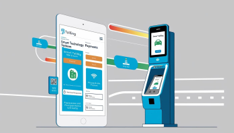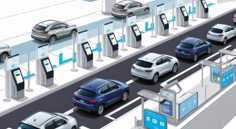By: Abraham Fiifi SELBY
:Ghana’s tolling system has long been a critical aspect of infrastructure maintenance and development, yet inefficiencies and accountability challenges led to its suspension in 2021.
In November 2021, Ghana’s government halted the collection of road tolls, citing inefficiencies, corruption, and traffic congestion at toll booths.
The decision to suspend tolls was met with mixed reactions, as many questioned how the country would replace the revenue generated for road maintenance and infrastructure development. (MoRH,2021)
In place of the traditional toll system, the government introduced the Electronic Transaction Levy (E-Levy) in May 2022.
The E-Levy imposed a 1.5% tax (later reduced to 1%) on electronic transactions, including mobile money transfers, bank-to-bank transfers, merchant payments, and inward remittances.
The government argued that the levy would provide a more efficient way to generate revenue for development projects, including road infrastructure, while addressing issues of evasion and mismanagement associated with toll collections (GRA, 2022).
However, the new government is considering its restoration, and this paper will help them with a focus on modernizing the system. The new system will address past issues such as congestion, pollution, and corruption, while ensuring transparency and efficiency in toll collection.
By embedding cutting-edge technologies into toll collection processes, Ghana can unlock a more transparent, efficient, and equitable system that meets global standards. (World Bank, 2022)
Background: The Need for Change
Road tolls were initially abolished due to their negative impact on traffic flow and the environment. However, the absence of tolls has resulted in a substantial revenue shortfall for road maintenance.
The new government has recognized the need to reinstate tolls, but this should be with a modern twist embracing technology to streamline the process.
The New Digitized Tolling System
The proposed system will utilize advanced technologies like Radio Frequency Identification (RFID) and electronic toll collection (ETC) to ensure seamless transactions. Here are some key features of the new system:
RFID Technology: Vehicles will be equipped with RFID tags that automatically deduct toll fees as they pass through designated points. This eliminates the need for physical stops, reducing congestion and pollution.
We should be prepared to have the Transport Card which can be linked to other management system and financial systems and every driver must be able to get that with designated stations in Ghana.
Centralized Payment System: All transactions will be recorded and managed through a centralized database, enhancing transparency and reducing the risk of corruption.
Implementing blockchain for immutable transaction records to eliminate revenue leakages and enhance public trust. A cloud-based platform will be needed to track real-time transactions, monitor revenue, and produce transparent audits accessible to oversight bodies.
Automated Barrier Control: Barriers will be lifted automatically once payment is confirmed, ensuring smooth traffic flow. Incorporating smart sensors to monitor road usage and optimize toll pricing dynamically based on traffic flow.
Mobile Updates: Users will receive SMS notifications for each transaction, keeping them informed about their toll payments.
Mobile Payment Integration: Enabling payments through popular mobile money platforms like MTN MoMo, Vodafone Cash, and AirtelTigo Money, which are widely used in Ghana.

Benefits of the New System
Reduced Congestion: By eliminating manual payment processes, traffic flow will improve significantly.
Increased Transparency: The centralized system ensures that all transactions are recorded accurately, reducing the potential for corruption. The payment will be managed by the assigned office or ministry which individuals assigned at various toll stations won’t be able to cut corners.
Environmental Benefits: Reduced idling times at toll booths will decrease air pollution. This is when most of the vehicles must wait in traffic causing more emissions into the air and such a reduction will help us manage climate actions through cars and other fossils.
Efficient Revenue Management: The system will help manage toll revenues more effectively, ensuring funds are allocated appropriately for road maintenance.
Job Creation in Tech and Maintenance: The deployment and maintenance of these systems will create opportunities for local tech experts and engineers.

Implementation Roadmap
Stakeholder Engagement: Collaborate with local technology firms, transport unions, and civil society organizations to design an inclusive system.
Legislative Support: Enact policies mandating the use of cashless payments and ensuring penalties for non-compliance.
Pilot Programs: Launch pilot tolling projects on key highways, such as the Tema Motorway, Kasoa-Winneba Highway and Accra-Kumasi Highway, to test and refine the system.
Public Education: Conduct nationwide campaigns to educate road users on the benefits and usage of the new tolling system.
Monitoring and Evaluation: Establish a dedicated task force to oversee the system’s implementation and performance.

Implementation Challenges
While the new system offers numerous benefits, its successful implementation will depend on several factors:
- Infrastructure Development: Upgrading existing toll booths and installing new RFID technology will require significant investment.
- Public Awareness: Educating the public about the benefits and usage of the new system will be crucial.
- Stakeholder Engagement: Collaboration with vehicle owners, transport operators, and local communities is essential for smooth transition.
Conclusion
Ghana’s decision to reintroduce road tolls with a digitized system should affects a commitment to modernizing infrastructure while addressing past challenges.
By leveraging technology, the government aims to create a more efficient, transparent, and environmentally friendly toll collection process.
As the system is set to be reintroduced in 2025, it will be important to monitor its impact on road maintenance and the overall transportation network in Ghana.
References:
- Ministry of Roads and Highways, Ghana. (2021). Press Release on the Suspension of Road Tolls.
- Ghana Revenue Authority (2022). E-Levy Implementation Guide.
- The World Bank. (2022). The Role of Digital Payments in Ghana’s Economy.
- (2022). E-Levy Revenue Projections Fall Short – Report.
Selby is a | PG, UCL, School of Public Policy, UK | Digital Analyst | Member – IIPGH, Internet Society (Ghana Chapter), ICANN, EGIGFA
This Publication is written in the author’s own capacity and is not affiliated with any of the membership organization.
Email: [email protected] or [email protected]










